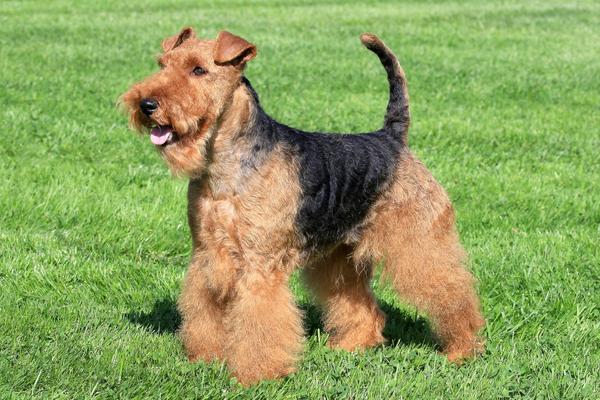Are Welsh Terriers Hypoallergenic?
Intelligent and high-spirited — that is the Welsh Terrier.
This energetic breed has a typical Terrier temperament, and they can be hard work for some owners. However, if you can deal with their stubborn and mischievous attitude, you’ll soon realize Welsh Terriers are good-natured and loving canine companions.
The Welsh sheds very little, and this makes them a great hypoallergenic dog. Their allergy-friendly coat is also straightforward to groom and keep in good condition.
Welsh Terrier Quick Facts
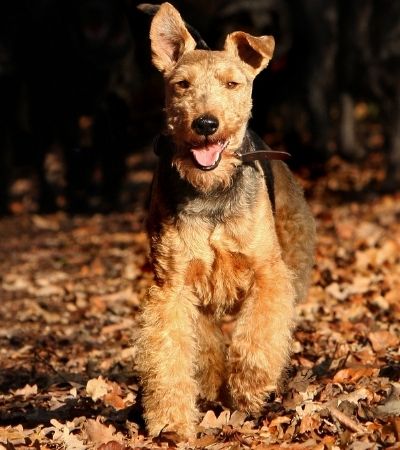
About the Breed
The Welsh Terrier Physical Characteristics and Coat
Medium-sized, stocky dogs, Welsh Terriers come in three color combinations — black and tan, black and grizzle, and grizzle and tan. If you’ve ever seen an Airedale Terrier, Welsh Terriers look like smaller versions. They have ears that are folded over — like triangles on top of their head, and long flat faces with a beard of scruffy hair around their snout.
Welsh Terrier’s Coat
The Welsh Terrier has a double coat of medium length. The fur on these dogs has a wiry texture and their coat is often referred to as ‘broken.’ In that, the coat is a mix of both rough and soft fur. Hence, this breed has a coarse outer coat, and the undercoat is both shorter and softer.
Welsh Terrier — Height and Weight
These mid-sized hypoallergenic dogs weigh approximately 20 pounds and will grow to around 15 inches. As with most dog breeds, females are noticeably smaller than their male counterparts.
Welsh Terrier Temperament
Terriers are well known for their challenging temperament. We don’t want to put you off — Terriers make awesome pets — but, there is no denying this breed group has a strong-willed and stubborn attitude that can test anyone’s patience. The Welsh isn’t immune to this feisty side either.
That said, this breed is slightly calmer than many other Terriers, and they’re loving and affectionate with their family.
What’s more, you don’t have to worry about your Welsh Terrier being aggressive with strangers. A well-socialized Welsh may be a little nervous around new faces, but they will quickly settle down — these dogs love making new human friends!
Are You Considering Getting a Welsh Terrier?
Here’s what to watch out for :
- Welsh Terriers have bags of energy to burn, and they’re very intelligent. It can be tough to keep them well-exercised and stimulated every day, on a regular basis.
- They love to dig.
- These Terriers don’t do well if you leave them home alone for long periods of time.
- Most Welsh Terriers aren’t that into swimming.
- Despite being super smart, Welsh Terriers can be tricky to train because of their stubborn, independent streak.
- These tail-waggers are sensitive, so you can’t lose your temper during training — even if you know they’re being wilfully stubborn.
- Your Welsh will without doubt chase your kitty.
- Having an extremely strong prey drive means that, at some point during their life, your Welsh Terrier is likely to bring you some small, dead animal. It’s not a good idea to leave them unattended with hamsters in hamster balls…definitely don’t do that.
- Welsh Terriers can be clever escape artists and are known to run off.
- These dogs require a lot of training and socialization from an early age, and keeping up with their behavior is a full-time, life-long job.
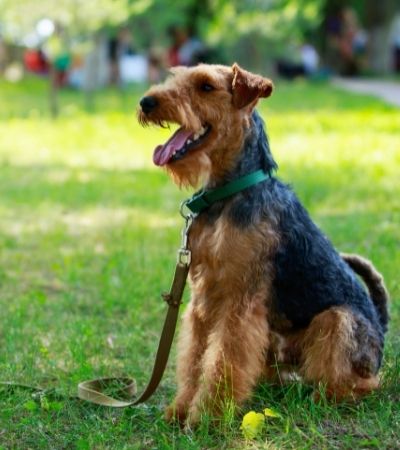
Welsh Terrier Training and Exercise
As we mentioned above, Welsh Terriers can be difficult at times, and this can make training challenging. This non-shedding dog may not be the breed for you if you’re a first-time pet parent. Welsh Terriers need a firm yet gentle training routine, and they will try and push your limits from time to time.
However, the Welsh won’t respond well to harsh training methods, it’s important to try and stay calm — even when they’re trying your patience. They’re an eager-to-please breed, but sometimes they can be too high-spirited for their own good!
Welsh Terriers are incredibly intelligent and need plenty of mental stimulation. To keep any bad behavior at bay, make sure you’re spending plenty of time playing with your pooch and teaching them fun new tricks.
Welsh Terrier Exercise Needs
As well as needing plenty of mental stimulation, the Welsh Terrier also needs daily exercise to remain content and well-behaved.
Approximately an hour of exercise a day is ideal for the Welsh. These dogs may not be big, but they have huge amounts of energy. Taking your Terrier out for an hour every day will keep them happy and healthy — and stop them from trashing your house out of pure boredom!
One note, remember that prey drive we talked about? When you’re out walking your Welsh woof woof, it’s wise to keep them on leash.
Maintaining Your Welsh Terrier’s Coat
Welsh Terriers come in three main color combinations, but no matter the color Welsh you choose, their coat will be almost completely non-shedding. However, non-shedding doesn’t mean non-grooming.
Some Welsh Terrier owners choose to ‘hand-strip’ their dog’s coat. As the name suggests, you pluck dead hairs from your dog’s double coat by hand. However, it isn’t as easy as it sounds and it’s a skill that can take time to perfect.
One of the best ways to groom your Welsh Terrier is with a pumice stone — we kid you not. Pumice stones strip away dead hair and debris from their coat. Alternatively, you can brush them once or twice a week.
As well as brushing, the Welsh Terrier’s coat requires clipping every 8 to 12 weeks. A regular trim is important to keep their coat in good condition and free from painful matting.
What Makes a Welsh Terrier Hypoallergenic?
Hypoallergenic dogs are breeds that release fewer allergens and are, therefore, less likely to cause an allergic reaction. Allergens can be found in a dog’s saliva, urine, and dander. When a dog sheds their coat, dander and allergens can be released and trigger allergy symptoms.
Welsh Terriers are hypoallergenic because they rarely shed or drool. Even when these dogs do lose fur, it becomes trapped between the layers of their double coat. And, regular brushing releases the dead hair in a controlled manner.
Teeth, Ears, and Nails
Welsh Terriers’ nails rapidly grow and need to be carefully clipped approximately once a week. Walking your pooch on hard surfaces can help wear down their nails naturally, but clipping them will ensure they’re kept short.
Practicing good dental hygiene is important for dogs too and you should brush your Terrier’s teeth every day — with canine-friendly toothpaste.
Unless your Welsh has an existing ear condition, their ears will only need to be cleaned once a month using a doggy-specific ear cleaning solution.
Welsh Terrier Health Issues and Care
- Hip dysplasia.
- Lens luxation.
- Keratoconjunctivitis Sicca.
- Glaucoma.
- Atopy.
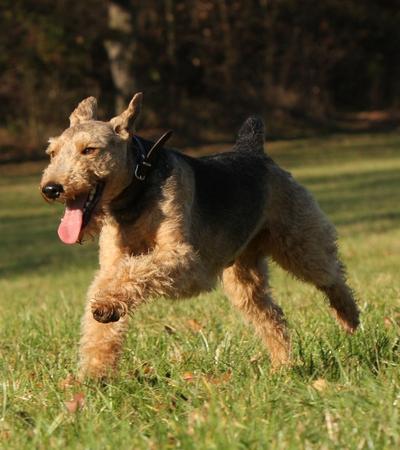
Similar Dog Breeds To Welsh Terrier
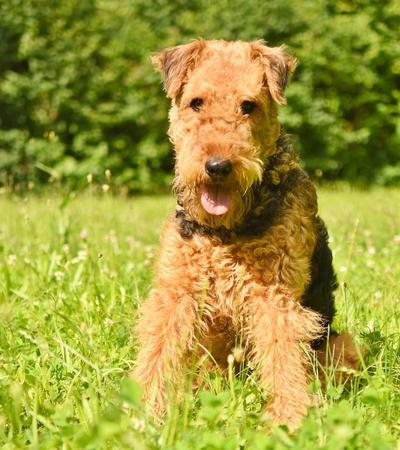

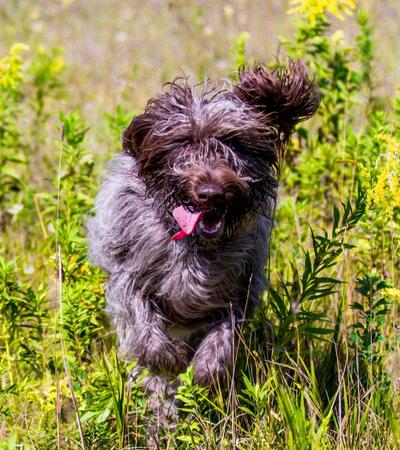
Conclusion
Welsh Terriers are intelligent and energetic dogs. This medium-sized breed loves to play and build strong bonds with their owners, but they can be strong-willed at times too.
If you can deal with their typical Terrier attitude, these dogs are funny and friendly canine companions. Finally, if you have allergies, we’re sure you’re pleased to learn that the answer to the question, are Welsh Terriers hypoallergenic? Is a resounding YES.
Hypoallergenic Welsh Terrier FAQs
Do Welsh Terriers Shed?
If you’ve been wondering, do Welsh Terriers shed a lot? — we have some good news. Welsh Terriers have a double coat — made up of a wiry outer layer and a soft undercoat. Yet, these dogs hardly shed, and any dead hair stays trapped in their coat. Hence, regular brushing is advisable to remove it.
Do Welsh Terriers Bark a Lot?
Like many Terriers breeds, Welsh Terriers can be yappy. These dogs will bark often and for a variety of different reasons. For example, to sound the alarm, when they’re excited, bored, or protecting their family. Also, it’s not uncommon for the Welsh Terrier to bark excessively when left home alone for long periods of time.
Are Welsh Terriers Good for Allergy Sufferers?
Yes. As an almost completely non-shedding dog, people with allergies can live happily with a Welsh Terrier in their home. However, no canine is truly allergy-free.
Are Welsh Terriers Good With Kids?
These friendly, playful, and high-energy dogs can keep up with children of all ages. The Welsh Terrier is affectionate and just loves playing, their energy and companionship will appeal to children.
Are Welsh Terriers Good Family Dogs?
Welsh Terriers form a strong bond with their owners and can make loving and protective family dogs. However, if you have other animals in your home, this may not be the best breed choice. Thanks to a strong prey drive, there is a high likelihood the Welsh will either chase your kitty cat or harm your hamster.
Is the Welsh Terrier Good for Apartments?
Welsh Terriers are an ideal size for apartment living, but they don’t have the best personality for the lazy, lap-dog lifestyle. This breed thrives on physical activity and will not be content inside all day. They’re likely to become bored and mischievous, especially if their owner has left them home alone.
What Are the Welsh Terrier Pros and Cons?
Pros
- Intelligent, friendly, and playful dogs.
- High energy.
- Great with kids.
Cons
- Strong-willed nature can make training challenging.
- High prey drive — likely to chase other animals.
- Difficult to trust off the leash.
Welsh Terrier Dog Facts Summary
| Breed | Welsh Terrier |
| Other Names? | Black and Tan Wire Haired Terrier / Old English Terrier |
| Hypoallergenic? | Yes |
| Height | 15 inches |
| Weight | 20 pounds |
| Lifespan | 12 – 15 years |
| Temperament | Intelligent, playful, active, friendly, energetic, high-spirited, stubborn, strong-willed, mischievous, affectionate, loyal |
| Colors | Black, tan, grizzle (various color combinations) |
| Coat | Double coat, wiry, broken, medium-length |
| How much grooming? | Low maintenance — weekly brushing, clipping needed every 8 – 12 weeks |
| How much shedding | Very low-shedding |
| Dander levels | Low |
| Saliva–Drooling and licking frequency? | Low |
| Energy levels | High-energy breed |
| How much exercise do they need? | At Least 1 hour of daily exercise |
| Health problems | Glaucoma, dry eye, hip dysplasia |
| Good for apartment? | No — needs plenty of exercise and can become bored inside |
| Suitable for kids? | Yes |
| How much do they bark? | Vocal |
| Can they be left alone? | Not good with being left alone |
| Intelligent? | Yes — and head-strong |
| Trainable? | Can be difficult to train — stubborn attitude but eager to please |
